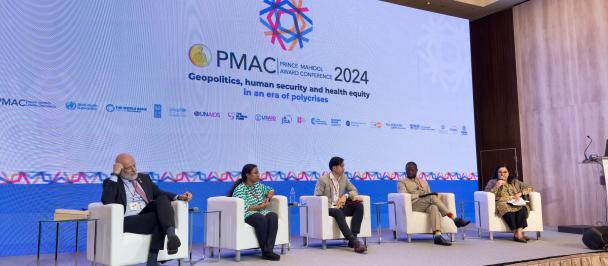Child receives MenAfriVac™ shot in Burkina Faso (photo copyright : WHO) Read more at: www.path.org/menafrivac/index.php
Partners launch new initiative to unite efforts across innovation, access and delivery of technologies for unmet health needs
BANGKOK – Recognizing the urgency of developing new lifesaving treatments for neglected tropical diseases (NTDs), malaria and tuberculosis and getting them to people in need, the Government of Japan, the UNDP-led Access and Delivery Partnership (ADP) and the Global Health Innovative Technology (GHIT) Fund today launched Uniting Efforts for Innovation, Access and Delivery, a platform to improve the innovation, access and delivery of medicines, vaccines, diagnostics and other health technologies for unmet health needs in low and middle income countries (LMICs).
While the world has seen tremendous health progress in recent years, millions of people still don’t have access to the health technologies they need to survive and thrive. Diseases affecting the world’s poorest people, such as NTDs, have often failed to attract the attention and funding needed to develop new health technologies. And even when treatments are developed, they are often not available or delivered at the country level, remaining out of reach for the people who need them most.
“We cannot achieve universal health coverage without improving access and delivery of new health technologies as well as innovation,” said Sumi Manabu, Director of the Global Health Policy Division of the International Cooperation Bureau of the Ministry of Foreign Affairs of Japan. “The Government of Japan is honored to support the dialogue among key stakeholders on these important issues as the first step to driving their collaborations needed to achieve global goals.”
Innovation and access are two sides of the same coin. Yet, there are few opportunities available for biomedical R&D funders, innovators and access stakeholders to discuss the common challenges they face and to jointly identify solutions.
There is a great deal to be learned from increased interactions between these groups: for example, with greater dialogue, funders can improve the impact and efficiency of current and future R&D investments and priorities; innovators can share challenges and good practices to increase efficiencies and factor access considerations into their plans at an earlier stage; and access and delivery stakeholders can share valuable insights into the key considerations needed to optimize the introduction of new treatments to those most in need.
Recognizing the untapped benefits of bringing together these different groups, Uniting Efforts for Innovation, Access and Delivery will convene partners who are concerned with improving the funding, innovation, access and delivery of health technologies for unmet health needs in LMICs and provide a platform for further discussion.
“Now more than ever, it is critical we link the discussions around global health R&D with conversations on access and delivery,” said BT Slingsby, CEO of the GHIT Fund. “By bringing together the key actors, we look to transform the way that medicines and other health technologies are financed, discovered, developed and delivered.”
Since 2013, the Government of Japan, ADP and the GHIT Fund have been working together to ensure that new health technologies are developed and delivered to the people who need them, with a focus on finding solutions for TB, malaria and NTDs. Uniting Efforts for Innovation, Access and Delivery marks a new initiative to expand the partnership and engage a broader range of stakeholders.
This week, the platform will hold its first dialogue, “Uniting Efforts for Innovation, Access and Delivery: A Global Dialogue” in Bangkok, Thailand. The event will bring together a global network of more than 100 R&D funders, product development partners and innovators, as well as organizations and platforms focused on the access and delivery of health technologies for unmet health needs in LMICs. The dialogue will provide an opportunity to share experiences and common challenges, identify best practices and explore opportunities for future collaboration.
“The January 2019 Global Dialogue is the first step to facilitating more and better collaboration across the range of partners involved in research, development, access and delivery,” said Mandeep Dhaliwal, Director of the HIV, Health and Development Group at UNDP. “If countries are to deliver on the commitments embodied in the 2030 Agenda including to leave no one behind, it is critical that we build and scale innovative partnerships that bring key actors to the table to accelerate progress.”
Media queries:
Sangita Khadka, Communications Specialist, UNDP Bureau for Policy and Programme Support, email: sangita.khadka@undp.org Tel: +1 212 906 5043

 Locations
Locations



